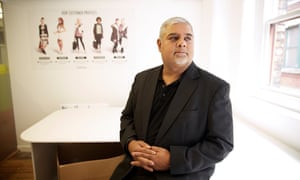Visits: 41
Boohoo sells dresses for £5 and jeans for less than £10, but its founders are multimillionaires who are lining themselves up for a £100m payout as online sales soar during the Covid-19 pandemic.
In less than 15 years, Boohoo has gone from a three-employee operation to a business with sales of £1.2bn and a 5,000-strong workforce that ships millions of parcels a week. Despite a dive in its share price this week, the company is still worth £3.5bn.
Its co-founder, Mahmud Kamani, 55, and his wife, Aisha, and sons Umar, Adam and Samir, have gone from a house in Chorlton, Manchester, to lavish lifestyles, with properties in New York and Dubai, among other places. The family’s glamorous existence is documented on Umar’s vibrant Instagram feed, which he uses to promote the brand he runs, Pretty Little Thing, to his 780,000 followers.
It all began with a market stall in Manchester. Abdullah Kamani, Mahmud’s father, supported himself by selling handbags after escaping war-torn Kenya in the 1960s to build a new life in the UK.
Abdullah went on to found a wholesale textile business, sourcing and selling garments, mainly from India, and becoming a major supplier for high-street names including New Look and Primark. His son Mahmud started working on the stall and grew up in the wholesale business, Pinstripe, delivering goods in a van for his father.
In 1993, Pinstripe hired Carol Kane, now 53, a fashion design graduate freshly back from a stint working in the Hong Kong garment-sourcing industry. Then in her mid-20s, she set up the group’s design team and gradually became a key player, co-founding Boohoo with Mahmud Kamani in 2006.
Having worked together for more than 25 years, the pair understand each other so well that they can finish each other’s sentences.
Kamani is known as a tough deal-maker with an imposing nature and sharp brain. Former business associates say he can be inspirational to his workers, although he is also known for his straight-talking style.

Mahmud Kamani started working on the stall his father, Abdullah, founded in the 1960s, and then in his developing wholesale business, Pinstripe. Photograph: Christopher Thomond/The Guardian
While Kamani is more focused on building Boohoo’s infrastucture behind the scenes, Kane oversees product ranges, relationships with online influencers and the customer-facing side of the business. She may be less fiery than Kamani, but knows how to stand up to him and is no pushover, with a black belt in kickboxing.
Back in 2006, the pair’s idea was to use the then new-fangled powers of the internet to sell direct to shoppers, cutting out the retail middlemen.
Both are steeped in the fashion sourcing industry and have used their knowledge and connections to create a fast-fashion engine that the company’s chief executive, John Lyttle, recently said could get a design on the website in as little as 48 hours.
Unlike its rival Asos, Boohoo sells only its own clothing, which gives it more control over profit margins and product. Its ability to source garments quickly in Leicester factories makes it more responsive to social media-fuelled trends.
Despite a series of reports raising concerns about conditions in Leicester, starting with an Ethical Trading Initiative report in 2015, which found garment workers were being paid as little as £3 an hour, Boohoo has become the predominant retail group dealing with suppliers in the city. Until this week it had shrugged off demands by the ETI, unions, NGOs and MPs to make major changes to its business practices.
Its fast-fashion model has proved so successful that profits soared 54% to £92m in the year to the end of February. The company, which was listed on the stock market in 2014, now has a higher value than Marks & Spencer and Asos.

Carol Kane and Mahmud Kamani co-founded Boohoo in 2006.
Shortly after unveiling the record profits, Boohoo announced a controversial bonus scheme under which its bosses could receive a £150m bonus if its shares rose by two-thirds in the next three years. Kane and Kamani would receive two-thirds of the payout.
Its ambitions to expand are clear. In May, Boohoo raised £200m to buy up brands, and has already snapped up the ailing high street names Oasis and Warehouse, as well as consolidating its stake in Pretty Little Thing – handing Umar Kamani and his business partner, Paul Papworth, more than £260m for their 35% stake.
Boohoo’s roster now includes Karen Millen and Coast, which it bought in August last year, as well as Nasty Gal and Miss Pap. The range of brands takes the company into older, more high-spending markets than the teens and twentysomethings that favour Boohoo. More acquisitions could be on the way.

